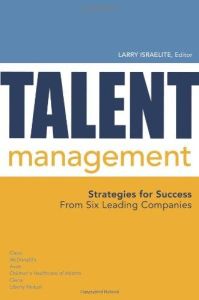Join getAbstract to access the summary!

Join getAbstract to access the summary!
Larry Israelite
Talent Management
Strategies for Success From Six Leading Companies
ASTD Publications, 2009
What's inside?
To survive the coming talent shortage without sacrificing your edge, take a few pointers from industry leaders.
Recommendation
Talent management is a fascinating topic full of potential for dramatic motivational speaking and cutesy pop psychology: Learn to manage talent, excite the troops, spread the vision, enlist the worthy, prepare the next generals and make a tidy profit, all while doing noble work. Alas, the real world of talent management isn’t that simple or passionate, but it does have room for plenty of inspiration, creativity and innovation. Editor Larry Israelite, a vice president and human resources (HR) manager at Liberty Mutual Group, compiles valuable, specific information that hits those high notes. He and the book’s other contributors present a fresh look at talent management ideas. A few of his writers overdo the HR-speak, but most stay pragmatic. From four steps for creating a talent plan to six success stories to 10 tips for getting on board with talent management, this book provides explicit advice for anyone seeking better talent management. getAbstract recommends it to human resources employees and managers as well as their superiors, up to and including CEOs.
Summary
About the Author
Longtime corporate manager Larry Israelite is a vice president and manager of human resources development for Liberty Mutual Group. He also edits and contributes to various publications.

















Comment on this summary